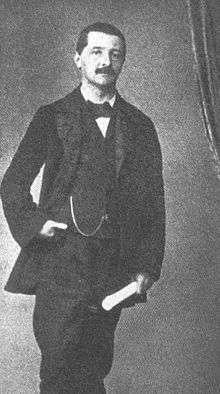Kronstorfer Messe
The Kronstorfer Messe, WAB 146, is a missa brevis composed by Anton Bruckner in 1843-1844.
| Kronstorfer Messe | |
|---|---|
| Mass by Anton Bruckner | |
 The young Bruckner | |
| Key | D minor |
| Catalogue | WAB 146 |
| Form | Missa brevis |
| Composed | 1843 – 1844: Kronstorf |
| Performed | 1 December 1974: St. Florian Monastery |
| Published | 1984 |
| Recorded | 1998 |
| Movements | 4 |
| Vocal | SATB choir |
History
Bruckner composed the Kronstorfer Messe, WAB 146, in 1843–1844, while he was a schoolteacher's assistant in Kronstorf. This Choral-Messe in D minor for mixed choir a cappella was presumably intended for the Lenten season.[1]
The work, the manuscript of which was archived in the St. Florian Monastery, was premiered by Augustinus Franz Kropfreiter on 1 December 1974 in the church of the monastery.[2] The work is put in Band XXI/41 of the Gesamtausgabe.[3]
Setting
The work is divided into four parts:
- Kyrie - Adagio, D minor
- Sanctus - Adagio, B-flat major
- Benedictus - Andante, F major
- Agnus Dei - Adagio, F major
Total duration: about 5 minutes.
This Missa brevis, also called Messe ohne Gloria [und Credo], exhibits relationships to Palestrina's style.[4] The mass survives only in a fragmentary state, without Credo.[5] The manuscript, with, on the front page, an autograph indication "Sine Gloria", contains two blank pages with an autograph indication that they were to contain a Credo in F major.[2][1]
Alike the contemporaneous Asperges me in F major (WAB 4), the Agnus Dei in F major contains audacious modulations.[1]
Note
The Sanctus is re-used in a slightly modified setting for that of the next Messe für den Gründonnerstag.[1]
Discography
There is a single recording of the mass:
- Jussi Kauranen, Tuhansin Kielin, Pirkanpojat boys' choir, Tampere (Finland), 1998 – CD PPCD 02, edited by the choir[6]
References
- U. Harten, pp. 288-289
- C. van Zwol, p. 710
- Gesamtausgabe - Kleine Kirchenmusikwerke
- J. Garrat, p. 183
- J. Williamson, p. 43
- Tuhansin Kielin (1998) - item 19: Anton Bruckner's Messe ohne Gloria und Credo
Sources
- Anton Bruckner – Sämtliche Werke, Band XXI: Kleine Kirchenmusikwerke, Musikwissenschaftlicher Verlag der Internationalen Bruckner-Gesellschaft, Hans Bauernfeind and Leopold Nowak (Editor), Vienna, 1984/2001
- Uwe Harten, Anton Bruckner. Ein Handbuch. Residenz Verlag, Salzburg, 1996. ISBN 3-7017-1030-9.
- James Garrat, Palestrina and the German Romantic Imagination, Cambridge University Press, Cambridge, 2004. ISBN 0-521-80737-9
- John Williamson, The Cambridge Companion to Bruckner, Cambridge University Press, Cambridge, 2004. ISBN 0-521-80404-3
- Cornelis van Zwol, Anton Bruckner – Leven en Werken, Uit. Thot, Bussum, NL, 2012. ISBN 978-90-6868-590-9
External links
- Messe ohne Gloria und Credo / Kronstorfer Messe, d-mol WAB 146 Critical discography by Hans Roelofs (in German)
- Kronstorfer Messe: Scores at the International Music Score Library Project (IMSLP)
- Smaller sacred works (1835–1892) Gesamtausgabe – Volume XXI
- Live performances of the Kronstorfer Messe:
- Erich Nowotny with the church choir of Kronstorf (20 May 1987) on John Berky's website: The "Kronstorf Mass".
- Michael Stenov with the Cantores Carmeli (13 April 2017) on YouTube: Anton Bruckner – Kronstorfer Messe WAB 146, Christus factus est WAB 9 etc.